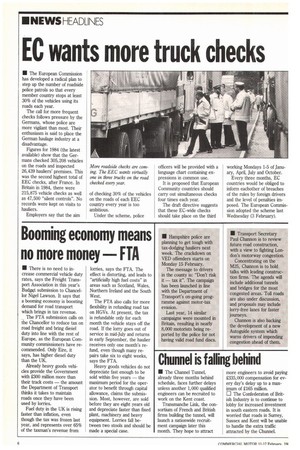Booming economy means no more money — FTA
Page 16

If you've noticed an error in this article please click here to report it so we can fix it.
• There is no need to increase commercial vehicle duty rates, says the Freight Transport Association in this year's Budget submission to Chancellor Nigel Lawson. It says that a booming economy is boosting demand for road transport which brings in tax revenue.
The FTA submission calls on the Chancellor to reduce tax on road freight and bring dieiel duty into line with the rest of Europe, as the European Community commissioners have recommended. Only Eire, it says, has higher diesel duty than the UK.
Already heavy goods vehicles provide the Government with 2300 million more than their track costs — the amount the Department of Transport thinks it takes to maintain roads once they have been used by lorries.
Fuel duty in the UK is rising faster than inflation, even though the tax was frozen last year, and represents over 65% of the taxman's revenue from lorries, says the FTA. The effect is distorting, and leads to "artificially high fuel costs" in areas such as Scotland, Wales, Northern Ireland and the South West.
The FM also calls for more flexibility in refunding road tax on HGVs. At present, the tax is refundable only for each month the vehicle stays off the road. If the lorry goes out of service in mid-July and returns in early September, the haulier receives only one month's refund, even though many repairs take six to eight weeks, says the FTA.
Heavy goods vehicles do not depreciate fast enough to be sold within five years — the maximum period for the operator to benefit through capital allowance, claims the submission. Most, however, are sold before they are eight years old and depreciate faster than fixed plant, machinery and heavy equipment. Lorries fall between two stools and should be made a special case.




































































































